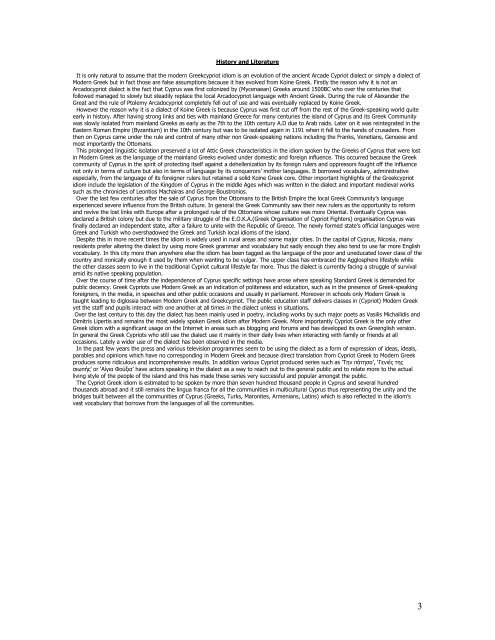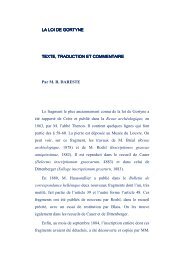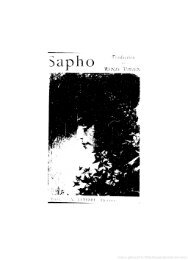CYPRIOT GRAMMAR
CYPRIOT GRAMMAR
CYPRIOT GRAMMAR
You also want an ePaper? Increase the reach of your titles
YUMPU automatically turns print PDFs into web optimized ePapers that Google loves.
History and Literature<br />
It is only natural to assume that the modern Greekcypriot idiom is an evolution of the ancient Arcade Cypriot dialect or simply a dialect of<br />
Modern Greek but in fact those are false assumptions because it has evolved from Koine Greek. Firstly the reason why it is not an<br />
Arcadocypriot dialect is the fact that Cyprus was first colonized by (Mycenaean) Greeks around 1500BC who over the centuries that<br />
followed managed to slowly but steadily replace the local Arcadocypriot language with Ancient Greek. During the rule of Alexander the<br />
Great and the rule of Ptolemy Arcadocypriot completely fell out of use and was eventually replaced by Koine Greek.<br />
However the reason why it is a dialect of Koine Greek is because Cyprus was first cut off from the rest of the Greek-speaking world quite<br />
early in history. After having strong links and ties with mainland Greece for many centuries the island of Cyprus and its Greek Community<br />
was slowly isolated from mainland Greeks as early as the 7th to the 10th century A.D due to Arab raids. Later on it was reintegrated in the<br />
Eastern Roman Empire (Byzantium) in the 10th century but was to be isolated again in 1191 when it fell to the hands of crusaders. From<br />
then on Cyprus came under the rule and control of many other non Greek-speaking nations including the Franks, Venetians, Genoese and<br />
most importantly the Ottomans.<br />
This prolonged linguistic isolation preserved a lot of Attic Greek characteristics in the idiom spoken by the Greeks of Cyprus that were lost<br />
in Modern Greek as the language of the mainland Greeks evolved under domestic and foreign influence. This occurred because the Greek<br />
community of Cyprus in the spirit of protecting itself against a dehellenization by its foreign rulers and oppressors fought off the influence<br />
not only in terms of culture but also in terms of language by its conquerors’ mother languages. It borrowed vocabulary, administrative<br />
especially, from the language of its foreigner rulers but retained a solid Koine Greek core. Other important highlights of the Greekcypriot<br />
idiom include the legislation of the Kingdom of Cyprus in the middle Ages which was written in the dialect and important medieval works<br />
such as the chronicles of Leontios Machairas and George Boustronios.<br />
Over the last few centuries after the sale of Cyprus from the Ottomans to the British Empire the local Greek Community’s language<br />
experienced severe influence from the British culture. In general the Greek Community saw their new rulers as the opportunity to reform<br />
and revive the lost links with Europe after a prolonged rule of the Ottomans whose culture was more Oriental. Eventually Cyprus was<br />
declared a British colony but due to the military struggle of the E.O.K.A.(Greek Organisation of Cypriot Fighters) organisation Cyprus was<br />
finally declared an independent state, after a failure to unite with the Republic of Greece. The newly formed state’s official languages were<br />
Greek and Turkish who overshadowed the Greek and Turkish local idioms of the island.<br />
Despite this in more recent times the idiom is widely used in rural areas and some major cities. In the capital of Cyprus, Nicosia, many<br />
residents prefer altering the dialect by using more Greek grammar and vocabulary but sadly enough they also tend to use far more English<br />
vocabulary. In this city more than anywhere else the idiom has been tagged as the language of the poor and uneducated lower class of the<br />
country and ironically enough it used by them when wanting to be vulgar. The upper class has embraced the Agglosphere lifestyle while<br />
the other classes seem to live in the traditional Cypriot cultural lifestyle far more. Thus the dialect is currently facing a struggle of survival<br />
amid its native speaking population.<br />
Over the course of time after the independence of Cyprus specific settings have arose where speaking Standard Greek is demanded for<br />
public decency. Greek Cypriots use Modern Greek as an indication of politeness and education, such as in the presence of Greek-speaking<br />
foreigners, in the media, in speeches and other public occasions and usually in parliament. Moreover in schools only Modern Greek is<br />
taught leading to diglossia between Modern Greek and Greekcypriot. The public education staff delivers classes in (Cypriot) Modern Greek<br />
yet the staff and pupils interact with one another at all times in the dialect unless in situations.<br />
Over the last century to this day the dialect has been mainly used in poetry, including works by such major poets as Vasilis Michailidis and<br />
Dimitris Lipertis and remains the most widely spoken Greek idiom after Modern Greek. More importantly Cypriot Greek is the only other<br />
Greek idiom with a significant usage on the Internet in areas such as blogging and forums and has developed its own Greenglish version.<br />
In general the Greek Cypriots who still use the dialect use it mainly in their daily lives when interacting with family or friends at all<br />
occasions. Lately a wider use of the dialect has been observed in the media.<br />
In the past few years the press and various television programmes seem to be using the dialect as a form of expression of ideas, ideals,<br />
parables and opinions which have no corresponding in Modern Greek and because direct translation from Cypriot Greek to Modern Greek<br />
produces some ridiculous and incomprehensive results. In addition various Cypriot produced series such as ‘Την πάτησα’, ‘Γενιές της<br />
σιωπής’ or ‘Αίγια Φούξια’ have actors speaking in the dialect as a way to reach out to the general public and to relate more to the actual<br />
living style of the people of the island and this has made these series very successful and popular amongst the public.<br />
The Cypriot Greek idiom is estimated to be spoken by more than seven hundred thousand people in Cyprus and several hundred<br />
thousands abroad and it still remains the lingua franca for all the communities in multicultural Cyprus thus representing the unity and the<br />
bridges built between all the communities of Cyprus (Greeks, Turks, Maronites, Armenians, Latins) which is also reflected in the idiom’s<br />
vast vocabulary that borrows from the languages of all the communities.<br />
3





